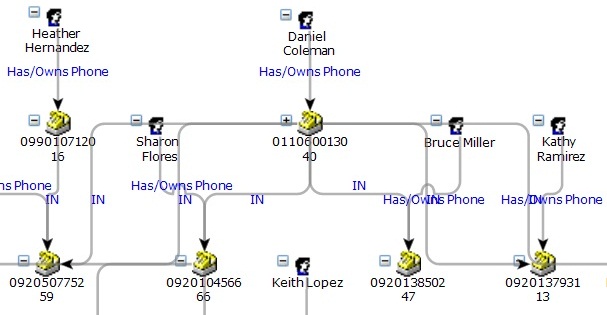Telephone Call Data Records Analysis Software
Free TrialWhat valuable information can you get out of huge amounts of telephone call records?
As you've heard, the government is trying to collect all the telephone call data records (CDR) for US and international phone calls though its PRISM program. This digital phone call tracking information includes:
- Calling phone number
- Receiving phone number
- When the call was made
- Duration of the call
- Sometimes, for cell phones, the location of the caller and receiver
Does having this information constitute snooping? Is it an invasion of privacy? Or can it really help investigators track, find, and thwart threats?
How Sentinel Visualizer Analyzes Call Data Records
Without advanced analytics software, the data is overwhelming. Sentinel Visualizer provides a platform to gain insight into the massive number of phone calls. It's about managing large amounts of data, seeing the relationships between entities (phone numbers and people), drilling down where necessary, and filtering based on time, geography, and relationships:

- Call detail records are imported into the Sentinel Visualizer database (SQL Server)
- Link Analysis Networks can be used to visually see the calls made by any phone number
- Multiple levels of phone calls can be linked to identify groups of phones related to each other (cells of activity)
- Geospatial Mapping and integration with Google Earth to see calls across the world
- Social Network Analysis (SNA) to identify related phones (cells) and spanners between cells
- Temporal Analysis can be used to filter data to specific time ranges
- If information exists for known individuals and their phone number(s), related phones can be quickly identified as warranting additional investigation
- Get Links Between Selected can be performed between multiple phone numbers to show all the phones related to them through multiple levels with an option to retrieve the smallest network, and quickly filter out the unrelated calls to identify the "community of interest"
- Numerous reporting and exporting options: print diagrams and customized reports, or export them in image, PDF, Word, Excel.
Too Much Data?
With billions of phone calls, this is certainly a Big Data problem. How could anyone possibly find anything of value amid all the innocent, unrelated calls? No one can possibly gain significant insight looking at an Excel spreadsheet or a database showing rows and columns of all those calls. Isn't it just noise?
It turns out one can gain a lot of knowledge from CDR when it's loaded into Sentinel Visualizer. Especially if there's additional information to identify phone numbers associated with known suspects.
Taking Advantage of a Phone Number
Of course, just having the call data records alone is pretty useless. One just gets a spaghetti chart of millions of phones calling each other.
Where it becomes valuable is when a phone number is identified with a threat (maybe a cell phone was accidentally left behind a crime scene). With that clue, investigators can expand their search using Get Links to visually see how it is related to other phones and potential suspects.
Prioritizing Resources to Investigate a Community of Interest
Law enforcement officials can't investigate everyone. While call data records on their own are not going to solve threats and crimes, they are one resource to help investigators prioritize where to focus their work.
With Sentinel Visualizer, analysts integrate and take advantage of all their evidence to quickly identify a community of interest for further investigations. CDR is one of the ways to manage their limited resources (budget, manpower, time) to prioritize their highest value targets.
Privacy Concerns
Is it a Threat to Individual Privacy Rights?
A big controversy is whether the collection of this data violates individual freedoms and privacy. Of course, a terrorist act such as murder is also a violation of personal rights, so the challenge is balancing the need to protect society versus changing our principles and way of life so much that the terrorists win.
What If We Didn't Keep the Data?
If the phone records are not collected and retained, and an incident occurred where the information could prevent further disasters and loss of life, citizens would be quite upset at officials for not doing so. The data is valuable and while it may not be predictive to prevent future activity on its own, once a suspect is identified, it can help identify related conspirators who may be monitored or captured through conventional means to thwart future activity.
While we appreciate the potential breach of privacy and civil liberties with such data, we strongly endorse the retention of all data while having stringent regulations on who and why people may have access to the data.


